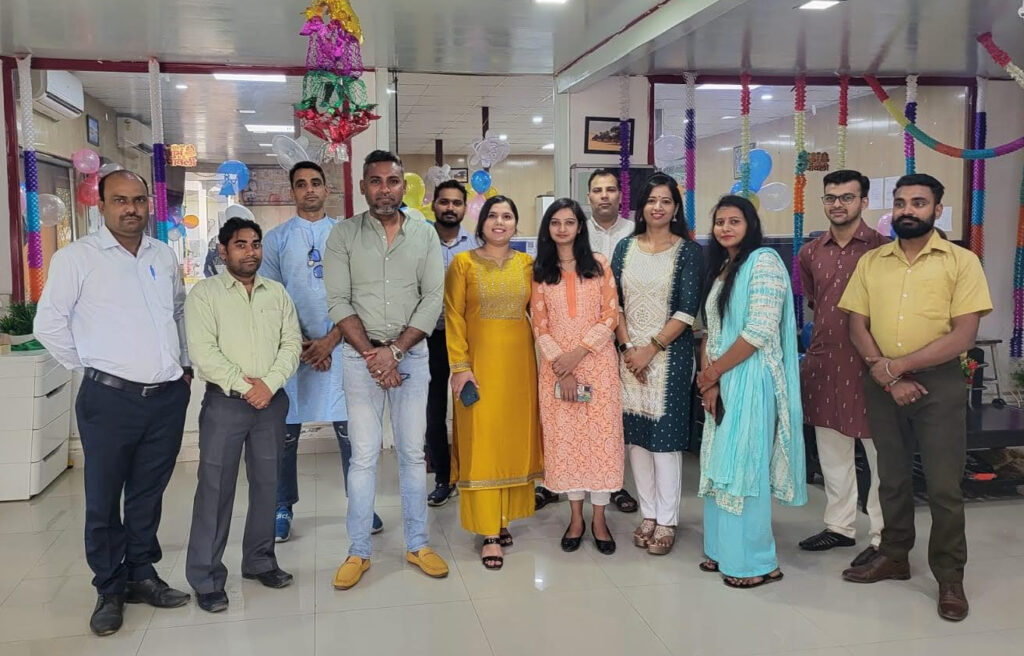Redefining Innovation in Construction: MDIPL Leads the Way on Climate Action
Being in the high-emissions construction sector hasn’t stopped Multi Decor India Private Limited (MDIPL) from spearheading climate initiatives that may seem out of reach for many companies. Passionate about reducing its emissions in a big way, this ambitious small business makes no compromises about sustainability, integrating emissions reduction strategies into the foundation of its business.
(MSMEs working to become more sustainable can kickstart their climate journey by making the SME Climate Commitment and join companies like MDIPL in reducing their emissions. Learn more here.)

Multi Decor India Pvt. Ltd. (MDIPL), founded 10 years ago, produces high quality prefabricated steel buildings and structures, including homes, offices, and transport containers. These buildings are partially or fully constructed in its factory and then transported on-site for assembly. Headquartered in Faridabad, India, this SME Climate Hub committed business has delivered successful projects across the country, designing and constructing buildings for businesses of all sizes, for individuals, and for the Government of India.
Climate action is at the forefront of MDIPL’s operations
Driven by escalating concerns over climate change and the pressing need to reduce its carbon footprint, this small business has proactively undertaken multiple initiatives, including installing solar panels, natural gas powered gensets, office building insulation and more. By next year, the company has plans to install an air to water machine for water conservation as well.
Transitioning to renewable energy
Installing solar panels across its facilities has been the cornerstone of MDIPL’s sustainability strategy. The initiative involved collaboration with solar technology providers, engineers, and renewable energy specialists to design and deploy the system. Solar energy now provides approximately 40% of the company’s energy requirement.
Besides contributing to cleaner air, this has significantly reduced the SME’s emissions and environmental impact compared to conventional fossil fuel-based electricity. Solar panel installation has allowed the company to achieve energy independence by minimizing its reliance on the grid, and the company plans to add even more solar capacity in the coming year.

Energy efficiency through insulation
MDIPL’s office and production floor have been equipped with high quality insulation, which plays a crucial role in reducing energy costs for heating and cooling. The new insulation system is designed to maintain optimal indoor temperatures, regardless of external weather conditions, which is crucial for enhancing energy efficiency given northern India’s extreme range of temperature.
As an additional business benefit, a well-insulated environment at the office has translated into the workforce enjoying a consistently comfortable working atmosphere. This has been important for the company in maintaining employee satisfaction and overall performance.
Besides enhancing its own business, MDIPL has prioritized smart material design by utilizing the same high-quality insulation technology in the buildings it supplies to clients, making them energy-efficient as well.
An innovative approach to water recycling
At the heart of the company’s infrastructure lies the Sewage Treatment Plant (STP) tank. This system employs a blend of biological and chemical processes to treat the wastewater generated on-site. The filtered water produced is then used for landscape irrigation, in office washrooms, and for cleaning at the company’s facilities.
“Harnessing recycled water has significantly reduced our reliance on fresh water, which is one of our most priceless resources. It’s everybody’s collective job to be responsible,” notes Pradeep Choudhary, Managing Director of MDIPL.
While gas and/or sludge are common byproducts of conventional STPs, the technology installed at MDIPL’s facilities are entirely zero waste.

Composting Machine
With a team of around 60 employees on campus, the office produces significant food waste. The company has proactively sought to eliminate this through the installation of a composting machine within the next year.
Further, this decentralized approach to waste management will reduce the need for off-site transportation of organic waste to landfills and lower carbon emissions associated with waste disposal.
Pradeep adds that the company is looking forward to using the compost that will be produced by the composting machine for landscaping, soil enrichment, and agricultural purposes.
Future Plans
The air-to-water system
Located in an area prone to water scarcity and facing increasing pressure on local water resources, MDIPL recognized the need to further diversify its water supply sources to minimize reliance on traditional ones.
The air-to-water system will use advanced atmospheric water generation technology to extract moisture from the air and convert it into high-quality drinking water. Through a process of condensation, and subsequent filtration and treatment, the system will ensure compliance with drinking water standards.
This will reduce the need for traditional water extraction methods, such as groundwater pumping or surface water diversion, which contributes to water scarcity.
Due to high energy requirements, the system will be powered through conventional sources of energy. However, the company plans to add 10-12 kilowatts of solar capacity by next year, which will contribute to 80-90% of the energy usage.

Taking challenges in its stride
Upfront investment costs: One of the primary challenges for the company has been the significant upfront investment required for implementing these sustainable technologies. To address this, MDIPL leveraged a loan from SIDBI for solar installation and the gas genset.
Pradeep explains, “Becoming a sustainable company has been in our mission statement from day one. While we’ve stayed ambitious, accessing funds to implement emissions reduction projects is often a challenge. I appreciate the SME Climate Hub for offering a platform where many different stakeholders are able to come together. In fact, we were able to access a climate finance loan from SIDBI by meeting them at one of the SME Climate Hub’s workshops.”
Technical complexity: Integrating multiple sustainable technologies into a single building design needed careful planning and coordination among architects, engineers, and technology providers. Ensuring compatibility, optimal system performance, and regulatory compliance was technically challenging, especially for the more complex systems like the STP tank. The company is taking a similar meticulous approach for the upcoming installation of the air-to-water system.
Space constraints: Most of the technology implemented by MDIPL has needed substantial space. The company notes that a key component of their sustainability strategy has been the initial planning to incorporate dedicated spaces at their headquarters and their facilities keeping this consideration in mind.
Operational and maintenance requirements: Sustainable technologies typically require regular maintenance to ensure optimal performance and longevity. For the STP tank and the solar plant, MDIPL has leveraged IOT technology for automation and monitoring. Through IOT devices, MDIPL is working on a dashboard to display real time energy and water savings.
Regulatory challenges: For MDIPL, implementing sustainable technologies involves navigating complex regulatory frameworks and obtaining permits or approvals from local authorities. However by factoring an estimated lead time while planning, the company was able to go ahead with these projects as scheduled.
Behavioral and cultural changes: Adopting sustainability in business required a shift in organizational culture for the MDIPL team. Educating employees about the benefits of sustainable technologies was necessary. They wanted to foster a culture of environmental responsibility to ensure long-term success.
A Call to action to its peers
By preemptively adopting clean energy solutions, MDIPL is staying ahead of regulatory changes and establishing themselves as responsible corporate citizens.
They add, “Today, small and medium businesses need to be passionate, proactive and innovative not just in business but also in their environmental efforts. Collectively, SMEs must solidify their position as global leaders in corporate sustainability. The SME Climate Hub and its free tools are great resources for businesses starting their climate action journey. ”
Tell us what climate action you’ve taken
MSMEs like MDIPL provide invaluable insights into how small businesses can identify areas of intervention and begin taking climate action. Interested in sharing your own climate journey for potential inclusion as a business spotlight? Get in touch.

 Go back
Go back






